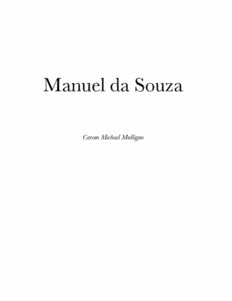
Manuel da Souza PDF
Preview Manuel da Souza
Manuel da Souza Carson Michael Mulligan I. Manuel comes from the Cantagalo favela near Ipanema Beach in Rio de Janeiro, Brazil. We sat at a cafe at the entrance to the favela one Friday night and talked. Since we sat down two rifle shots were fired close to the north. He assured me they were not gunshots, only fireworks. Another gunshot rang out with the metallic crack of a rifle report. Manuel grinned, “badaba- papapapa.” A group of young women walked up the hill towards the rifle report and the music. Another shot rings out. Manuel was born in 1994 and he attended middle school and high school in Switzerland. His mother owns the cafe and his grandmother used to own the big house now surrounded by the L’Homme hotel. For a time he lived in my building. Now he works at a hotel and lives rent-free in a house he built in the Cantagalo favela. He knows everybody here and took me on a tour through Cantagalo over to Pavão. Along the way we saw men and kids with guns. Manuel says the favela is safe tonight because of the party and he took me to the place where the party will happen. It is a basketball court with large speakers playing rap. At the entrance there was an old man with a short barreled AR-15. On the handle there was a painted American flag. We walked west along the narrow path. Above were low hanging cables and a power line. At the end of the path we reached a viewing point with an elevator tram now out of use. A teenage kid with red eyes dangled a glock in his left hand. Sheepishly he looked at me and hid it away behind his leg and under his back pack. He talked to Manuel about a shipment of drugs coming up the stairs. “Agora?” Manuel asked. “Sim.” The kid replied. “Valeu,” and we left, going back the way we came. Through the chainlink onto the basketball court I could see more men with guns. ”When I came back from Switzerland I vowed to stay only in the favelas. I earned good money there, in Swiss Francs,” he said, “but I spent Swiss Francs, too.” “Here in Rio,” he continued, “the money I earn at the hotel is not good, but I pay no rent. It is cheap to live and I know everybody. If I leave I go only to other favelas or to the beach. Thats it.” He talked about the party going on tonight from midnight to dawn in Rocinha. ”If you want to come I will take you. It’s safe.” “There is only one rule in the favela,” he advised, “don’t pay any attention to any girls unless I tell you its cool. If you talk to the wrong guy’s girlfriend that’s the quickest way to die. The only way to get hurt.” Manuel works nights at the Copa Hotel. ”Each month I earn two thousand real (around four hundred U.S. dollars). But I have a son.” I asked him about the police. How did you manage to stay out of it all? ”For me, I was in Geneva. For other kids it goes like this.” The wood table had a crease down the middle. ”On the right, the phone is the police. Across the crack to the left, the notebook is the trafficker. From beginning to end the line represents one hundred years. The police and the traffickers face each other around year 17 and shoot. As the kid, beginning at zero, represented by the cup, grows up he must make a decision.” He said. “The traffickers are bad people, but the police only kill. When they look at you, it’s not as if they look at a human being. From a young age the kids see this.” He pointed to his eyes. “The traffickers help their mothers with money and pay for their school and medical bills. They are their friends and brothers. I know they are bad people,” he said, “but I prefer the traffickers to police. ”The police are here to protect gringos but you should be careful with them too.” He explained a time when he was stopped by police on his motorcycle without his identification. ”No identification, okay.” He paraphrased the cop saying, “where is the cafezinho?” Manuel knew what he meant and gave up one hundred real. I asked Manuel about the gangs. Manuel, reclined in his plastic chair by the street, sat up at attention and looked about. ”CV they are called. Commando Vermelha” he pointed down to the chair, “red like this.” “They are the only gang in this favela,” he continued, looking around and speaking softly. “Only Leme has a different gang and I do not go to Leme.
